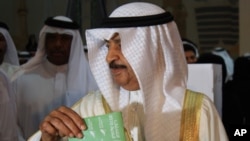Last month, the prime minister of Bahrain Khalifa bin Salman al-Khalifa was all smiles as he voted in his country's parliamentary elections in front of a swarm of cameramen. But outside the polling station, the situation was much less jovial.
Opposition parties were complaining of arbitrary arrests and some media outlets said they had been shutdown by the government.
A similar situation allegedly has been unfolding in Egypt in the run-up to its parliamentary elections scheduled to be held on November 28.
Middle East analyst at IHS Global Insight Sara Hassan says it is a worrying trend.
"I think these countries are struggling to deal with the implications of having a proper democracy and I think they've reverted back," said Hassan. "So we have seen a certain degree of regression in terms of reform."
Hassan says part of the problem could be a lack of support for democratic reform in the Gulf from the United States and other Western powers.
"Several years ago there was a huge push for greater democratization in the region," she said. "It was high on President Bush's agenda, but we've seen this suddenly start to slip as what are deemed as more important foreign policy issues take over."
However, Hassan points out that introducing a political model that is not in tune with local traditions and customs could be equally destabilizing.
The traditionally authoritarian Gulf States have a history of consensus building and democracy at local levels.
Christopher Davidson of the Institute for Middle Eastern and Islamic Studies at Durham University says these established practices must be incorporated into any new system.
"What we really need to see, I think, is a kind of democracy in the Gulf that is connected somehow to the anthropological reality of the region," said Davidson. " We haven't quite seen that yet. What we've seen in Kuwait and Bahrain to some extent are Western-style democratic implants that haven't quite worked well alongside tribal structures and the system of consultation that was already in place."
Kuwait and Bahrain are the only Gulf nations that have an elected parliament, although smaller steps towards more representative governments have been seen throughout the region.
In every country, ultimate power still lies in the hands of ruling families, but Davidson says it is only a matter of time before substantial democratic advances are made.
"All the Gulf States will run dry of hydrocarbons at some point," he said. "They're putting a lot of emphasis on diversifying their economies, but without great results yet. So, the bottom line is: Bahrain has more or less run out of oil and gas, which means its ruling family is no longer able to distribute wealth and privileges and opportunities to its population in the way it used to and it's had to give a bit in the form of allowing some political opening. I think the neighboring Gulf States, especially ultra-rich Qatar and United Arab Emirates are looking rather fearfully at what's happening in Bahrain. Could it be something they themselves will have to face in the not too distant future?"
Despite the controversy surrounding Egypt's upcoming elections, Davidson says it could lead residents throughout the Gulf to question their governments.
"I think any genuine elections that do take place elsewhere in the Arab world, whether Iraq or Egypt, cannot fail but to have some kind of demonstration effect on the youthful citizens in these Gulf States," he said "And of course many Arab expats, including Egyptians, live and work in the Gulf and these ideas must surely cross over into the local population."
Egypt's parliamentary elections precede a presidential vote scheduled for September next year. But, if history is any indicator, few in the Gulf see elections as harbingers of regime change.
Gulf Countries Advised to Avoid Egypt-Style Democracy











